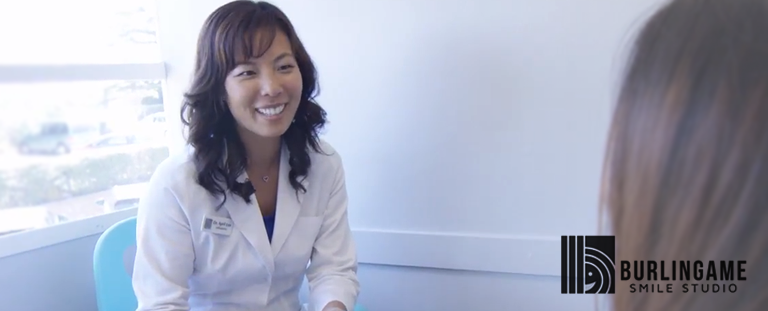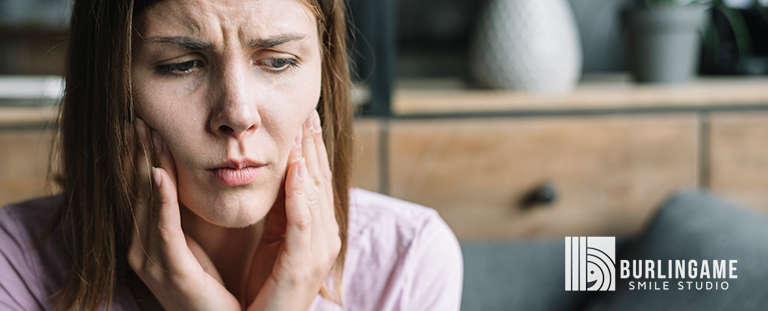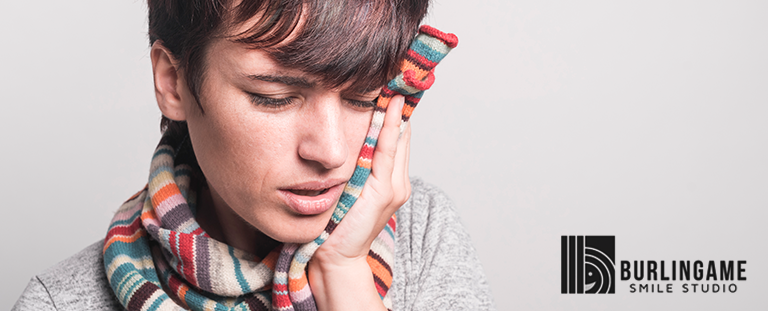
You have likely heard of bruxism probably not called bruxism and called teeth clenching. The condition occurs when patients clench their teeth together.
Bruxism is typically the cause of enamel erosion and is responsible for it in about 10 to 30 percent of the population in the US.
Most patients clench and grind their teeth in their sleep and unconsciously throughout the day. The condition is not done on purpose and is more of an involuntary response, usually to stress, although there can be other reasons for it. Sometimes, bruxism occurs when patients have a bite misalignment or when there is a problem tooth or tooth that is not properly in alignment with the others, which can lead to bite problems.
If you think that you have bruxism, or you think you have worn down your teeth due to clenching, now is the time to book a consultation with Dr. April Lee from Burlingame Smile Studio. The quicker you receive treatment, the less likely you will cause permanent damage or damage serious enough to warrant restorative dental procedures.
It would not be unheard of for a patient to say they have clenched their teeth or woke up with some TMJ pain due to a small bout of clenching their teeth. This happens and if the condition is mild or infrequent, it is not necessarily a concern.
If the condition persists or you notice that you are clenching your teeth more often and have broken a tooth or even experienced TMJ pain for a significant amount of time, you need to seek dental help from Dr. April Lee. As bruxism progresses and becomes worse, it can become a serious problem and turn a beautiful smile into a frown.

Continued grinding and clenching of your teeth will lead to loosen teeth, broken teeth, fractured teeth, and teeth that shift in place or become misaligned. This means that if you are currently receiving orthodontic treatment and have braces, you want to address the condition before it reverses the results you are achieving or did achieve with orthodontic treatment.
Individuals who happen to grind and clench their teeth at night typically suffer from other conditions such as sleep apnea or snoring.
If bruxism is considered chronic, then it will lead to additional dental procedures that need to be performed such as crowns, root canals, tooth extractions, veneers, and more. If the grinding and clenching continues and is severe, it could result in tooth loss and it can cause the jaw to become sore or damaged. TMJ is usually the result of bruxism and is one of the common reasons for TMJ or TMD pain.
TMJ is the acronym for temporomandibular joint, which is the joint that connects your jawbone to your skull. While it is important to note that not all causes of TMJ are from bruxism, it is one of the leading causes and common in patients who have TMJ and bruxism.
Symptoms of bruxism include:
- Soreness in or near the ear
- A face that aches or pain near the jaw line
- Locking of the jaw joint which may or may not prevent the opening and closing of the mouth
- Tenderness of the jaw or jaw joints
- Grating or clicking noises from the jaw joint when opening and closing the mouth
- Pain while chewing
If you thought those symptoms were bad, many patients do not know but bruxism can change the way your face looks by adding bulk to the muscles. If you think about it, it makes sense – your muscles are getting a workout for at least 6 to 8 hours when you sleep. Our strongest muscle is the masseter, which is the cheek muscle that aids in chewing. This muscle alone can exert up to 600 pounds of force per every square inch.
How Would I Know if I Did Grind My Teeth?
There are some signs and symptoms you want to watch out for including:
- Face pain or tenderness in the jaw
- Teeth clenching or grinding
- Pain that mimics an earache or ear infection
- Dull headache that starts out near or in the temple area
- Teeth that are loose, chipped, broke, flattened, or fractured
- Tight or tired jaw muscles
- Increased sensitivity of your teeth
- Indentations on your tongue
- Worth tooth enamel
- Your mouth does not open and close properly
- Damage from chewing on the inside of your cheek as opposed to on your teeth
Dr. April Lee says that if you suspect you may be clenching or grinding your teeth, you need to seek out professional care from her office immediately. Burlingame Smile Studio is here to help you.
Treatment Options for Bruxism

Fortunately, there are treatment options for bruxism and they include:
Avoiding chewing gum as this can aggravate the muscles in the mouth
Reduce or remove the number of caffeinated beverages consumed
Relax the jaw by applying a moist heat to it
Avoid drinking alcohol as it can cause bruxism to intensify
In addition to the above treatments, there are two additional ones, which include:
Braces
If you have a malocclusion or abnormal bite, braces can be the right step towards a life free from bruxism. A proper bite is essential and when your teeth are misaligned or not in the correct position, it can lead to bruxism and more damage to the teeth themselves. A straight smile, achieved through braces, can help eliminate bruxism and prevent damage to your teeth.
Night Guard
A night guard that is placed in your mouth when you sleep is a great way for you to prevent clenching and protect your teeth at the same time. When you wear a night guard, even if you do clench, the teeth will not be damaged as they are pressing down on the flexible acrylic and not on other teeth.
Schedule an Appointment Today
Dr. April Lee wants to hear from you and help you if you are suffering from bruxism. Call Burlingame Smile Studio today to schedule your consultation.
